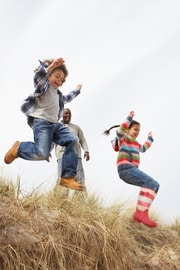What Kids Can Learn About Self-Confidence From the Outdoors
Not only can too much time in front of a computer, tablet, or phone impact the mental and physical health of kids and teens, but things like social media and YouTube can actually diminish their self-confidence. They become so used to the “highlight reels” of people’s lives, or of influencers who simply aren’t living the way the rest of us do.
So, they think if they aren’t living up to those standards, they must be doing something wrong. The CDC reports that kids ages 11-14 spend an average of nine hours a day in front of a screen. Surrounding ages vary by a few hours, but the statistics provide the same response – that’s a lot of tech time.
What’s the solution? Why not an outdoor adventure?
Getting kids outside can help with problem-solving, creativity, and self-reliance. A recent report found that four out of five kids feel more confident after participating in outdoor activities. So, how can you encourage your kids to spend more time outside? What can you do to create confidence in outdoor spaces and build characteristics that will have a positive impact on them for life?
Get Creative With Camping
Camping is a great way to bond with your kids. Camping is one of the best ways for kids to build self-confidence outdoors. It’s self-reliance 101, and while you can help with things and be a positive teacher, your kids will learn that they can accomplish difficult things on their own, and enjoy the rewards that come with it. If you want to help boost your kids’ confidence while camping, you can start by tying it in with some standard safety procedures, including:
- Respecting wildlife
- Using tools properly
- Packing the right gear
- Staying on marked trails
- Learning how to start a fire
Not only can camping give your kids a boost in responsibility, but it allows them to expand their view of nature. Things like hiking, kayaking, and climbing are all great ways to get them interested in the great outdoors while building their confidence and self-esteem.
As you go on more family camping adventures, you can help your kids become even more confident by letting them pack their own bag or allowing them to pitch the tent when you hit your campsite. Those might seem like small things now. But, they are lessons your children will carry with them into adulthood, and they’ll come in handy when they need to feel confident in their problem-solving abilities.
Build Confidence Through Ride-On Adventures
One of the best ways kids can develop self-confidence outdoors is by getting behind the wheel—of their very own ride-on vehicles! These kid-friendly Power Wheels offer more than just fun; they provide valuable learning experiences that boost independence. Children are given the opportunity to take control of their movements, learning how to steer, accelerate, and navigate different terrains.
Whether they’re maneuvering through the backyard, riding down a paved path, or tackling small hills, every ride is a chance to gain confidence in their abilities. Kids are more likely to develop a “can-do” attitude that carries over into other areas of life—whether it’s trying new activities, solving challenges, or simply feeling more capable in their everyday adventures.
Finding Self-Confidence in Sports
Youth sports have many physical benefits. They can help to manage weight, improve overall cardiovascular health, and strengthen bones and muscles. Most kids have a lot of natural energy that can be “burned off” through an organized sport – it can sometimes just take a little nudge to get them started.
Beyond the physical benefits of spending time outside playing a sport, there are many mental health perks, too, including:
- Reduced stress/anxiety
- Socialization
- Resilience
- Higher self-esteem and confidence
Studies have shown that kids who participate in sports tend to have higher self-esteem and happiness. That can come from practicing something difficult and seeing the positive results, or realizing they’re getting stronger or better at something over time.
Not all sports are outdoors, of course. But, signing your child up for an organized sport that’s primarily played outside can provide two-fold benefits. Spending time in nature is a natural mood-booster and can reduce stress. It’s a great way for kids to feel their best so they have the opportunity to let their self-confidence bloom.
Splitting From Screens
You don’t have to push your kids into a specific “box” when it comes to getting them outside. Simply making sure they get out there is the important thing. What they do from that point is up to them. Whether it’s playing a game of tag with their siblings, reading a book on the front porch, or going for a walk around the neighborhood, simply spending time outdoors can help them to build confidence and have a better understanding of who they are.
One of the best ways to make sure your kids spend enough time outdoors is to set boundaries on screen time. Your expectations should be clear and concise. Once your kids understand the rules regarding their digital devices, they’re less likely to push back. You can use the great outdoors as an option for them to enjoy when they’re done with tech for the day. Assure them that doesn’t mean they need to spend hours outside (though, as they get used to the benefits and realize they can have fun, they’re likely to spend more time out there every day).
Research suggests that as little as five minutes of activity outside every day can boost self-esteem. By encouraging your kids to spend more time outdoors now, you can set them up to form healthy habits in the future, and to be more confident in their abilities as they grow into adults.




